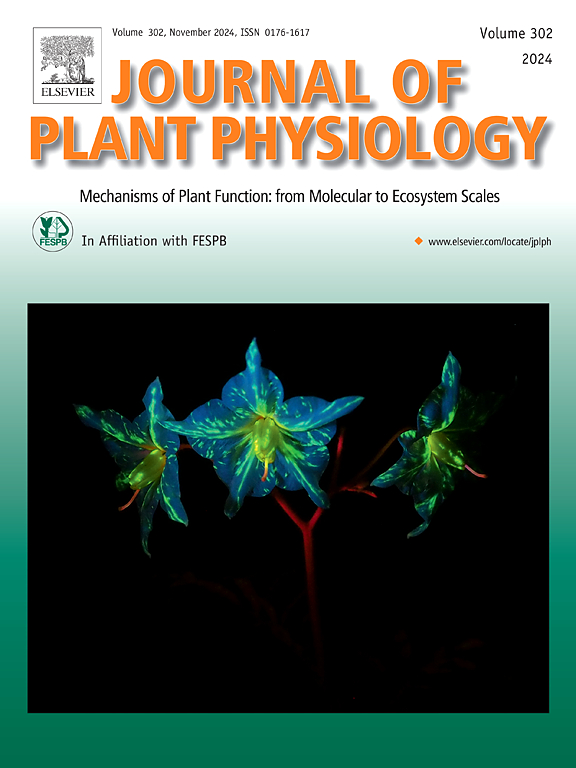Sink-source driven metabolic acclimation of winter oilseed rape leaves (Brassica napus L.) to drought
IF 4
3区 生物学
Q1 PLANT SCIENCES
引用次数: 0
Abstract
The crop cycle of winter oilseed rape (WOSR) incorporates source-to-sink remobilisation during the vegetative stage as a principal factor influencing the ultimate seed yield. These processes are supported by the coordinated activity of the plant’s central metabolism. However, climate change-induced drought will affect the metabolic acclimation of WOSR sink/source relationships at this vegetative stage, with consequences that remain to be determined. In this study, we subjected WOSR to severe soil dehydration for 18 days and analysed the physiological and metabolic acclimation of sink and source leaves along the kinetics in combination with measurements of enzymatic activities and transcript levels. Overall, the acclimation of WOSR to drought led to subtle regulations of central metabolism in relation to leaf growth and Pro-induced osmotic adjustment. Notably, sink leaves drastically reduced their growth and transiently accumulated starch. Subsequent starch degradation correlated with the induction of beta-amylases, sucrose transporters, pyrroline-5-carboxylate synthases and proline accumulation. The functioning of the tricarboxylic acid cycle was also altered in sink leaves, as evidenced by variations in citrate, malate and associated enzymatic activities. The metabolic origin of Pro in sink leaves is discussed in relation to Pro accumulation in source leaves and the up-regulation of amino acid permease 1 and glutamine synthetase genes.
冬季油菜叶片(Brassica napus L.)对干旱的沉降源驱动代谢适应性。
冬油菜(WOSR)的作物周期包括无性阶段的源到汇再移动,这是影响最终种子产量的一个主要因素。这些过程由植物中央代谢的协调活动支持。然而,气候变化引起的干旱将影响无性繁殖阶段 WOSR 吸收汇/来源关系的新陈代谢适应性,其后果仍有待确定。在本研究中,我们将 WOSR置于严重的土壤脱水中 18 天,并结合酶活性和转录本水平的测量,分析了汇和源叶片的生理代谢适应动力学。总之,WOSR 对干旱的适应导致了与叶片生长和 Pro 诱导的渗透调节有关的中枢代谢的微妙调节。值得注意的是,下沉叶片的生长急剧下降,并短暂积累淀粉。随后的淀粉降解与诱导β-淀粉酶、蔗糖转运体、吡咯啉-5-羧酸合成酶和脯氨酸积累有关。从柠檬酸盐、苹果酸盐和相关酶活性的变化可以看出,三羧酸循环的功能在下沉叶片中也发生了改变。本文结合源叶中脯氨酸的积累以及氨基酸渗透酶 1 和谷氨酰胺合成酶基因的上调,讨论了沉降叶中脯氨酸的代谢来源。
本文章由计算机程序翻译,如有差异,请以英文原文为准。
求助全文
约1分钟内获得全文
求助全文
来源期刊

Journal of plant physiology
生物-植物科学
CiteScore
7.20
自引率
4.70%
发文量
196
审稿时长
32 days
期刊介绍:
The Journal of Plant Physiology is a broad-spectrum journal that welcomes high-quality submissions in all major areas of plant physiology, including plant biochemistry, functional biotechnology, computational and synthetic plant biology, growth and development, photosynthesis and respiration, transport and translocation, plant-microbe interactions, biotic and abiotic stress. Studies are welcome at all levels of integration ranging from molecules and cells to organisms and their environments and are expected to use state-of-the-art methodologies. Pure gene expression studies are not within the focus of our journal. To be considered for publication, papers must significantly contribute to the mechanistic understanding of physiological processes, and not be merely descriptive, or confirmatory of previous results. We encourage the submission of papers that explore the physiology of non-model as well as accepted model species and those that bridge basic and applied research. For instance, studies on agricultural plants that show new physiological mechanisms to improve agricultural efficiency are welcome. Studies performed under uncontrolled situations (e.g. field conditions) not providing mechanistic insight will not be considered for publication.
The Journal of Plant Physiology publishes several types of articles: Original Research Articles, Reviews, Perspectives Articles, and Short Communications. Reviews and Perspectives will be solicited by the Editors; unsolicited reviews are also welcome but only from authors with a strong track record in the field of the review. Original research papers comprise the majority of published contributions.
 求助内容:
求助内容: 应助结果提醒方式:
应助结果提醒方式:


